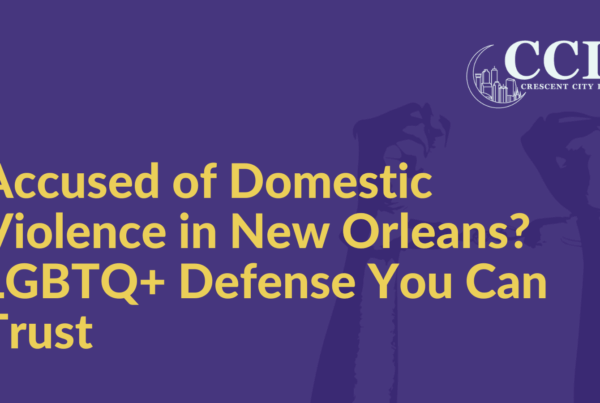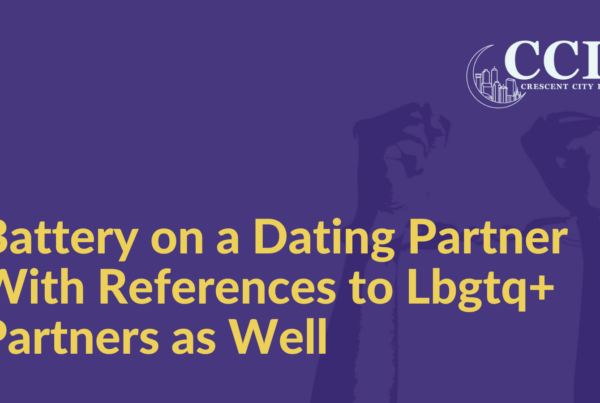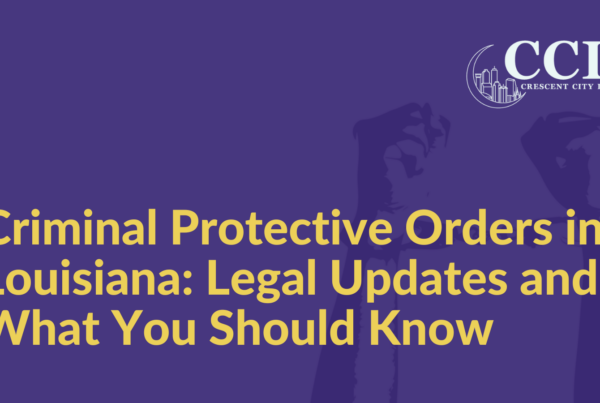Confrontations can arise in any relationship, between dating partners, spouses, roommates, or family members, regardless of gender or sexual orientation. But when arguments escalate and the police are called, the consequences can be serious. You may find yourself facing charges such as assault, battery, or domestic abuse, even if the incident was a misunderstanding or if you acted in self-defense.
At Crescent City Law, we understand that LGBTQ+ individuals may face unique challenges when navigating the criminal justice system. Unconscious bias, harmful assumptions, and procedural unfairness can influence how a case is investigated, charged, and prosecuted.
Led by defense attorney John Radziewicz, our firm has represented clients across New Orleans in criminal court, including those within the LGBTQ+ community facing charges that put their rights and future at risk.
Assault vs. Battery: What’s the Legal Difference?
In Louisiana, assault and battery are distinct offenses, and are defined as follows:
Assault
Under La. R.S. § 14:36, assault is the intentional threat or attempt to harm someone that causes them to fear immediate injury. No physical contact needs to occur.
Battery
Under La. R.S. § 14:33, battery is the actual use of force or violence against another person.
These charges often arise from the same incident. A verbal threat may result in an assault charge, while even minor physical contact may result in a battery charge. In many cases, individuals are arrested for both offenses based on the same set of facts.
What Is “Battery on a Dating Partner” Under Louisiana Law?
Louisiana law includes a specific charge known as Battery of a Dating Partner, defined in La. R.S. § 14:34.9. This applies when one person intentionally uses force or violence against someone they are, or were, romantically or intimately involved with.
You can be charged with Battery on a Dating Partner if the alleged victim is:
- A current or former dating partner
- Someone you’ve had an intimate relationship with
- A fiancé(e) or someone you were previously engaged to
This statute applies equally across all genders and sexual orientations. Same-sex and LGBTQ+ relationships are fully recognized under this law.
Common Scenarios Where Assault or Battery Charges Arise
At Crescent City Law, we’ve represented clients facing criminal charges under a variety of circumstances, including:
- Disputes between romantic partners or spouses
- Verbal arguments that escalated into physical altercations
- Self-defense during an attack
- False accusations made during a breakup
- Incidents involving roommates or family members
Regardless of how it began, if the police are called and an accusation is made, you can be arrested, even if the other party doesn’t want to press charges later.
Why LGBTQ+ Individuals Face Added Legal Challenges
Unfortunately, LGBTQ+ individuals often face added scrutiny or bias when accused of assault or battery. These challenges may include:
- Misidentification of the aggressor due to gender norms
- Unfair assumptions during police investigations
- Lack of understanding from officers or prosecutors regarding LGBTQ+ relationships
- Dismissal of self-defense claims or de-escalation efforts
At Crescent City Law, we know that every case deserves fair and equal treatment. Our criminal defense team investigates thoroughly, ensuring that no assumptions or stereotypes cloud the truth of what happened.
We understand the full legal impact these charges can have, not just on your record and reputation, but on your ability to access housing, employment, custody, or travel freely in the future.
Penalties for Battery on a Dating Partner
Penalties depend on whether this is your first offense or a repeat incident, and whether any aggravating factors (such as serious bodily injury or presence of a child) are involved. Even for a first offense, you may face:
- Up to six months in jail
- Mandatory domestic abuse intervention programs
- Probation with strict terms
- Protective orders barring contact or access to your home
- Loss of parental rights in custody disputes
- A permanent, non-expungable criminal record if convicted under domestic abuse battery statutes
Under Louisiana law, a conviction for domestic abuse battery cannot be expunged, meaning it will stay on your record permanently.
What Happens If the Victim Wants to Drop the Charges?
Many people believe that if the alleged victim changes their mind or chooses not to press charges, the case will go away. However, in Louisiana, only the prosecutor (District Attorney) can decide whether to pursue or drop charges. Even if the alleged victim does not want to cooperate, the state may continue prosecution.
This is why you must seek legal counsel immediately, even if the incident seems minor or resolved.
What to Do if You’ve Been Accused
If you’ve been arrested or accused of assault or battery, it’s critical to contact a defense attorney immediately. In many cases, the alleged victim does not have to press charges for prosecution to move forward. Once the police file a report, the decision to pursue the case lies with the District Attorney’s Office.
Even if you believe the situation is being resolved privately, the state can still move forward with the case. Early legal intervention can significantly affect the outcome, especially if evidence is weak, the arrest was based on assumptions, or self-defense is a valid argument.
Crescent City Law takes the time to review every detail, interview witnesses, request surveillance footage, and evaluate whether the arresting officers followed lawful procedures.
Contact Our LGBTQ+ Assault and Battery Lawyers at Crescent City Law Today
At Crescent City Law, we recognize that LGBTQ+ individuals often face additional barriers in criminal defense cases. Whether you’ve been accused by a dating partner, spouse, roommate, or family member, you deserve a legal team that will protect your rights, not judge your relationship.We provide strong, respectful legal representation that prioritizes justice, due process, and your future. Contact us today at 504-264-9492 for a confidential, free consultation and immediate legal support.






